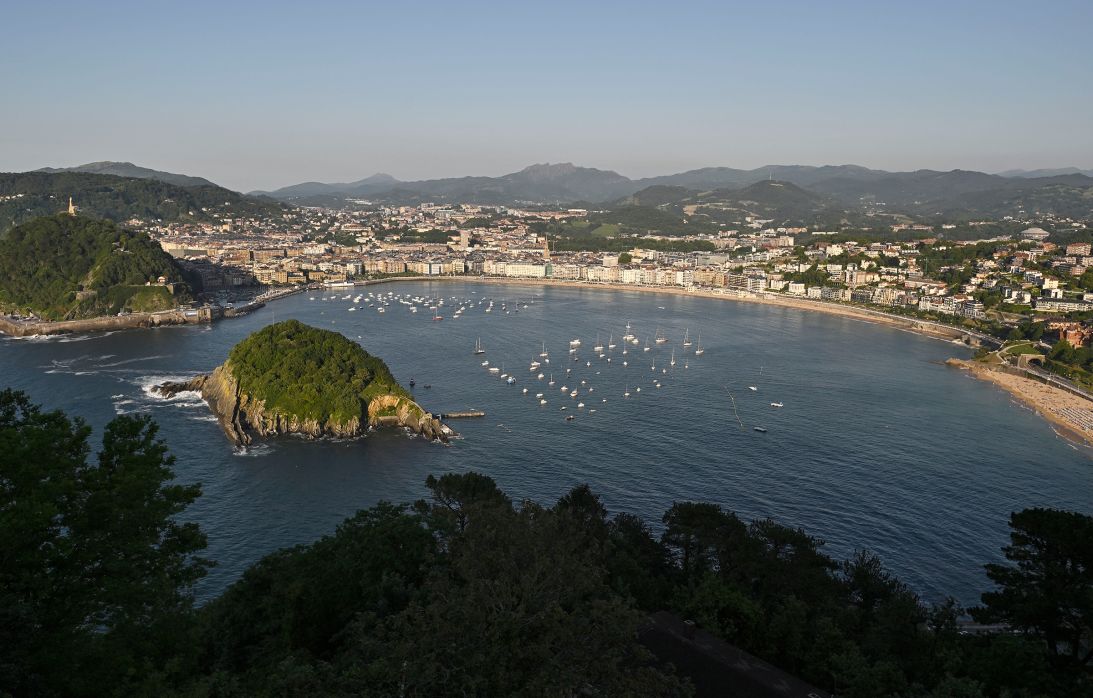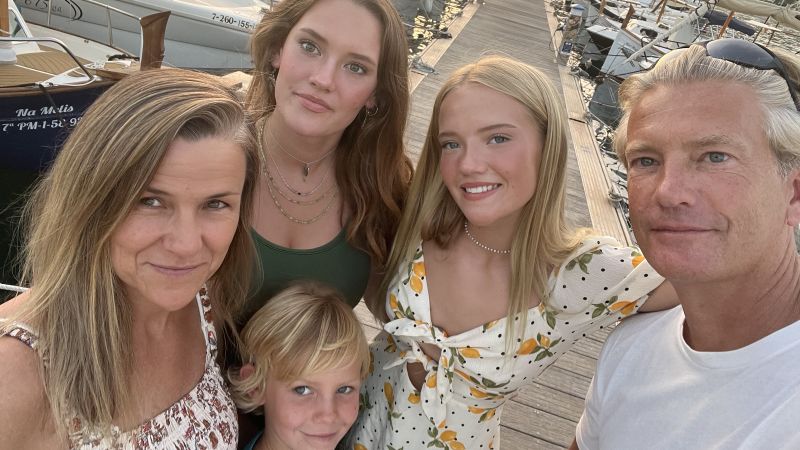As she casually traverses one of the most scenic stretches of the Spain’s Camino de Santiago, taking in the rugged beauty of the northern coast with her husband and three children, Dr. Colleen Crowley feels a wave of gratitude for where life has taken her.
For many, hiking a section of Europe’s most storied pilgrimage route would be a once-in-a-lifetime journey. For Crowley, an American psychologist, and her family, it’s part of daily life.
She knows the landscape so well that one might assume she had lived here for decades. In fact, they arrived just three years ago, along with her mother, then aged 80, and the family dog, Mo.
“It sounds so trite, but I think everyone is much happier here,” she said, describing the move as “amazing and transformative” for all of them, particularly her three children, who were aged 16, 13 and 8 at the time.
“All three of them say, ‘‘We wish we had done it sooner.’ Which is really kind of amazing to see.”

Crowley and her husband had long planned to live abroad once they had children, but they were waiting for the right time.
“I think for both of us, it’s sort of just been foundational to who we are,” she said. “To sort of live in different cultures and communities. And it felt sort of antithetical to who we are to just reside in one location.”
Crowley is originally from Colorado. Before moving to Spain, the family lived for a decade in Montecito, California, a coastal enclave in Santa Barbara County where Oprah Winfrey and the Duke and Duchess of Sussex own homes.
“It was a wonderful place to raise a family,” Crowley said. “But honestly, maybe a little too wonderful. It’s very manicured. It’s very limited.”
She wanted her children’s perspectives to be “in a way that staying in such a sheltered environment would not allow for.”
But leaving the close-knit community was difficult, especially as she and her husband, an environmental lawyer, she both had demanding jobs. “It can be tricky,” she said. “We both had big careers, and three kids in different developmental places.”
The shift toward remote work during the Covid-19 pandemic made the leap easier. Her eldest daughter graduated from high school around the same time, tipping the scales.
“So between our careers, and where our kids were developmentally, we were like, ‘I think it’s time to go,’” she added.
Why Spain? Crowley had long been intrigued by the country, partly through the works of Ernest Hemingway, and then an ancestry test revealed she had Spanish heritage.
The family also considered Chile, which she and her husband first visited together in 1997, but Spain seemed the more natural fit — even though she had never been there.
“We wanted to live in a place where we could pursue our love of the outdoors — surfing, skiing and hiking,” she said. The children took part in the decision-making process.
They sold their four-bedroom home, pared down their belongings and persuaded her mother to join them. Crowley obtained a non-lucrative visa for her mother, which allows non–European Union citizens to live in Spain without working if they can prove they have sufficient funds. She and her husband were granted digital nomad visas, which allow remote work for up to five years.
In July 2022, the family flew from Los Angeles to Barcelona with 10 suitcases, then boarded a ferry to Mallorca, the largest of Spain’s Balearic Islands.
Mallorca, popular with visitors from around the world for its sheltered coves and limestone mountains, offered an easy adjustment. But after six months, the family felt it wasn’t the right fit.

“It’s very international, which made the transition a little bit easier,” Crowley said. “But we really wanted family and nature and a Spanish experience.’”
So they tried San Sebastián, the food capital of northern Spain’s autonomous Basque Region, known for its striking coastline, world-class surf breaks and surrounding mountain trails.
“We knew we had found the spot for us after two days,” Crowley said. “The size, geography and nature were a great fit for what we prioritize and value.”
They rented a home and began establishing routines: enrolling the children in sports, finding doctors, joining friendship circles, discovering grocery stores. “It’s a process,” she said.
Integration has not been without challenges. Basque culture, she noted, is “known to be quite insular.” While locals have been kind, many socialize primarily within cuadrillas — close-knit friendship groups formed in youth. “We will never be in a cuadrilla,” she said. “But you find some special relationships and that sustains you.”
The family spends much of their time outdoors, hiking sections of the Camino de Santiago, surfing in nearby France and exploring the Pyrenees. “We had a really lovely quality of life in Montecito,” she said. “But it’s just different here. It’s just a different ethos entirely, and a significant increase in quality of life.”
Most of the family has picked up Spanish easily, but Crowley admits she is still learning. They are also studying Basque, though she calls it “a really difficult language to learn.”
They eventually moved into one of the few large houses in San Sebastián, with views of both the ocean and town — a rarity in a city dominated by apartments. Her mother lives nearby, in a flat overlooking the Bay of Biscay.
“Because we work from home and have a big dog, apartment living was a stretch for us,” Crowley said. “There are not many homes like this in the area so we were lucky to find it.”
They have a car but rarely use it, preferring to travel by bicycle. “In the United States, you have two cars. You’re always driving, and it’s horrible. So that’s been amazing,” she said.
Crowley feels that the most valuable aspect to living in Spain has been the difference in her children’s perspectives of the world.
“There’s a diversification and a worldview that has been monumental,” she said, explaining that her older children now “travel constantly, and have friends all over the world.”

“How they think about the world, how they move through the world, the skills they have… I mean, we traveled the world and lived abroad, and so we had a lot of that.
“But to sort of watch that unfold. Seeing them sort of create their lives in a way that it would have never been had we stayed in California… There’s just tremendous satisfaction.”
The biggest cultural adjustments have been Spain’s slower bureaucracy — which they jokingly call “getting Spained.” Crowley recalled walking into various government buildings “to get one of the million things you need to get” and never quite managing it the first time around.
“You’re lucky if you hear back in two weeks” when you send an email, she added.
“But that’s also part of the ethos of Spain, which is nice. There’s just more balance and less panic.”
The family has also had to adapt to the Spanish schedule, which sees some businesses close for siesta in the afternoons.
“Man, siesta gets me every time,” says Crowley. “I work in the morning, I get all my paperwork done. So then I’m ready to run errands at 1:30 p.m. And I get there, and of course, they’re closed.
“And then it goes quite late… But I mean, nothing that’s been challenging. If anything, it’s the opposite… It’s been so refreshing to see the difference in their culture.”
Spain’s cost of living has also been a positive shift. Even in San Sebastián, among the country’s pricier cities, they live on roughly half of what they spent in Montecito.
She has also been impressed with Spain’s public health care, particularly after her mother received treatment for health issues. “The level of care… the responsiveness,” she said, “has been amazing.”
Her mother’s proximity to them has been invaluable, Crowley said. “If we would have to go back to visit her… California is far from Spain. And there are so many other places we’re trying to explore.”
Crowley said she hasn’t returned to the United States since the move, and neither have her children. “My kids have no desire to go back,” she said.
Since relocating, she has combined her psychology background with her personal experience to create a workbook and online course guiding others through the process of moving abroad.
“Everybody sort of has a fantasy to move abroad,” she said. “Whenever you tell someone, I don’t care who they are, they’re like, ‘Oh, I’ve always imagined moving to Thailand or wherever. And so I sort of accidentally got contacted by all these friends of friends and family of friends asking for tips and tricks.
“It’s really fun to watch people decide where they’re going to move to start living out their dream.”
And as her own family continue to live out their dream in Spain, Crowley is in awe of her three children, who she said have been “leading the charge” in redefining their lives.
“My 16-year-old said to me a year ago, ‘Sometimes I feel like life didn’t start for me till I moved abroad…’” she said. “They could land anywhere on the planet now and thrive… Even traveling doesn’t give you that.”

